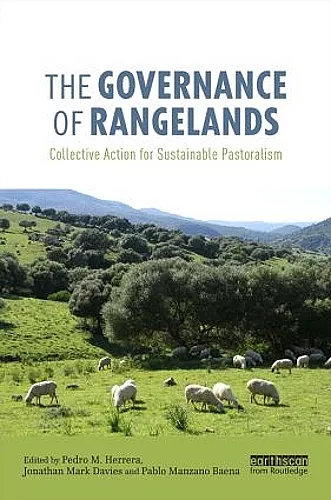The Governance of Rangelands
Collective Action for Sustainable Pastoralism
Jonathan Davies editor Pedro M Herrera editor Pablo Manzano Baena editor
Format:Hardback
Publisher:Taylor & Francis Ltd
Published:13th Oct '14
Currently unavailable, and unfortunately no date known when it will be back
This hardback is available in another edition too:
- Paperback£47.99(9781138574816)

This book explores the governance of rangelands, highlighting the challenges of communal management by pastoralists. It examines various governance levels and presents case studies from different regions to enhance understanding and promote sustainability.
The Governance of Rangelands explores the complexities of managing vast natural landscapes, including grasslands, shrublands, savannahs, and woodlands. These rangelands are heavily influenced by herbivores, particularly those in domestic herds managed by mobile pastoralists. The book highlights how communal management of these areas allows pastoralists to benefit from flexible resource access throughout the seasons. However, this shared approach also presents significant challenges for governance and institutional frameworks.
The author delves into the critical role of governance in maintaining the sustainability of rangelands. It emphasizes the need to strengthen governance structures and outlines the principles that contribute to effective management. The discussion covers various levels of governance, including community, state, and international, while addressing the unique characteristics of rangelands that necessitate collective action. Factors such as ecological imbalance, issues of scale, and seasonal variations are examined to illustrate the complexities involved.
Additionally, the book presents a range of case studies from diverse regions, including Africa, the Middle East, Central Asia, Europe, and North America. These examples provide valuable insights and lessons that can inform better governance practices for rangelands and the livelihoods of pastoralists. By summarizing these contrasting experiences, the author aims to promote a deeper understanding of governance challenges and opportunities in rangeland management, ultimately advocating for sustainable practices that can prevent degradation and support local communities.
"It is not through universities but through daily practices. It is not through few academic years of study or research but through centuries of love and interaction. It is not through greedy private ownership but through collective rights and stewardship that we, pastoralists, learned how to and did keep the rangelands for "us" and others to enjoy them, feeding our livestock, fighting diseases maintaining our souls and contributing to carbon capturing. It is time that all states and controlling parties recognize and respect pastoralists' collective land rights as a legal and legitimate way of governance so that sustainability of pastoralism is ensured, and pastoralists’ contribution to food security and carbon sequestration is continued. This book is an important contribution showing many experiences of cooperation based on the traditional knowledge and the sense of ownership of the communities to rangelands. The book brings successful stories of rangeland governance where win-win situations are achieved and conflict among different communities has reduced. The variety of success stories should inspire us all to follow the proven success for a more flourishing and peaceful planet!" – Khalid Khawaldeh, Member, World Alliance of Mobile Indigenous Peoples (WAMIP)
"A clear, empirically based, and well-argued manifesto for how to reverse decades of ill-informed policies, and instead recognise and support one of the planet's most sustainable production and land use systems – starting with the critical step of protecting the territorial rights of pastoralists" – Michael Taylor, International Land Coalition Secretariat
"It was in the early nineties and I visited Chad late in the long, dry season. In the Batha Province, north of the provincial capital Ati, I came across lush grasslands where Dorcas Gazelles abounded. There were empty villages with many granaries, all full of millet. An old man that had stayed behind told us that the herdsmen, owners of the granaries and the traditional waterholes, were still in the South, but moving northwards. They would soon be back. Granaries and grass were to feed the herdsmen, their families and livestock before the rains would arrive, new grass would grow and fields with Millet could be harvested again for the next cycle. I realized that I was witnessing some of the last vestiges of pastoral traditions in Africa. Here, traditional management of natural resources survived, respected by all stakeholders. Transhumant and nomadic pastoralists are not always popular with some governments. Their ephemeral stay in places makes them difficult to control, to tax. And yet, as the above example shows, their traditional way of life is based on sound ecological principles. There are lessons to be learned. Lessons that may need to be adapted to the requirements of modern times, but we should make sure not to lose access to this rich source of indigenous knowledge." – Piet Wit, Chair, IUCN Commission on Ecosystem Management
ISBN: 9781138785144
Dimensions: unknown
Weight: 750g
320 pages